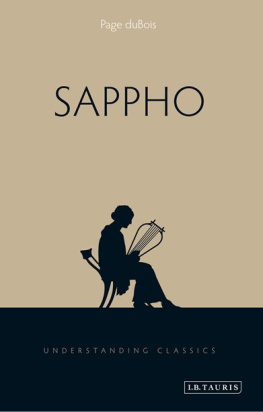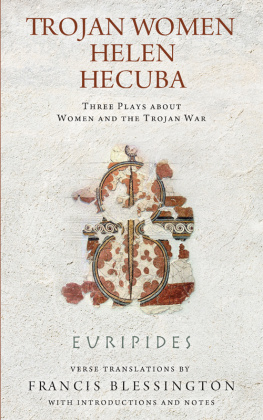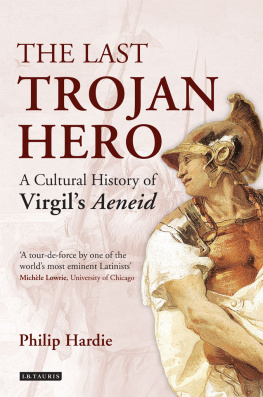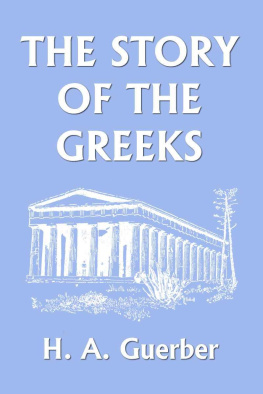Thank you for buying this ebook, published by NYU Press.
Sign up for our e-newsletters to receive information about forthcoming books, special discounts, and more!
Sign Up!
About NYU Press
A publisher of original scholarship since its founding in 1916, New York University Press Produces more than 100 new books each year, with a backlist of 3,000 titles in print. Working across the humanities and social sciences, NYU Press has award-winning lists in sociology, law, cultural and American studies, religion, American history, anthropology, politics, criminology, media and communication, literary studies, and psychology.
Trojan Horses
Trojan Horses
SAVING THE CLASSICS FROM CONSERVATIVES
Page duBois

NEW YORK UNIVERSITY PRESS
New York and London
2001 by New York University
All rights reserved
Library of Congress Cataloging-in-Publication Data
duBois, Page.
Trojan horses : saving the classics from conservatives /
Page duBois.
p. cm.
Includes bibliographical references and index.
ISBN 0-8147-1946-5 (acid-free paper)
1. Classical philologyStudy and teachingUnited States.
2. Civilization, ClassicalStudy and teachingUnited States.
3. Classical literatureHistory and criticismThoery, etc.
4. EducationPolitical aspectsUnited States. 5. Education,
HumanisticUnited States. 6. ConservatismUnited States.
I. Title.
PA78.U6 D83 2001
880.9001dc21 00-012244
New York University Press books are printed on acid-free paper,
and their binding materials are chosen for strength and durability.
Manufactured in the United States of America
10 9 8 7 6 5 4 3 2 1
for John Daley
Contents
Trojan Horses

1
Whose Greeks?
What cant be exhausted is the always-new adjustment every age makes to the classical world, measuring itself against it. If we set the classicist the task of understanding his own age better by means of antiquity, then his task has no end.
Nietzsche, We Classicists
I believe that reading ancient Greek art and culture can illuminate and enrich our present circumstances, but also that the Greeks were far stranger, more complicated, and more ambiguous than they might appear in much that circulates about them in the current climate. There is more to know, and much more to say about our relationship to the past of classical antiquity. The interpretation of the Greek and Roman classics, rather than dead, as some alarmists claim, remains as always a contested field, one in which conflicting interpretations clash, one about which I want to have my say here.
Americans are witnessing a resurgence of interest in the classics. Garry Wills discussed this phenomenon in an article in the New York Times Magazine (February 16, 1997), calling attention to a rising tide of books, films, and television programs devoted to the ancient Greeks and Romans. We have seen the success of a television series on the deeds of the mythological Greek hero Hercules, and a miniseries version of Homers Odyssey. The television program Xena, Warrior Princess, features a heroine modeled on the ancient myth of the Amazons, like Wonder Woman before her. Disney has released an animated feature film on Hercules, and followed it with stage shows and spectacles at various Disneylands and-worlds. Best-sellers recount the myths and legends of classical antiquity. Self-help books point to the ancient gods and goddesses as timeless paradigms of human character. At the beginning of the twenty-first century, people continue to be fascinated by the remnants of the cultures of ancient Greece and Rome, two millenia distant in time.
Enrolled in my course in classical mythology are students of literature and the classics, but also students majoring in political science, animal physiology, cellular biology, art history, general biology, structural engineering, physics, economics, human development, history, ecology, media, and anthropology. These students come from many cultural and ethnic backgrounds. They dont have to take this course; it doesnt fulfill requirements for their majors. But they are nonetheless curious about the stories of ancient Greek heroes and gods, of Helen, of the wooden horse that smuggled the Greek heroes into the city of Troy, of Heraklesas the Greeks called Herculesand of Persephone, the daughter of Demeter seized by the god of the dead, who ate a pomegranate seed in the underworld and was required forever to spend a third of the year with her husband in the world of the dead, while her mother mourned above and brought winter to the earth.
I want to share with contemporary readers, many of whom read the myths of the ancient Greeks in school long or not so long ago, the variety within ancient Greek culture, its fascinating practices in the domains of politics, sexuality, and religion. There is much new scholarship in these fields, some of which is listed at the end of this book, and I would like more people to know another version of the Greeks from that often promoted in the popular press. Among other things, some of these Greeks thought women had dangerously powerful sexual drives, that the public allusion to sexual positions was comic, and that homoeroticism was one of the gifts of Aphrodite. These Greeks participated in a radical democracy, one in which each citizen had a right to speak and vote without being represented by an elder or a better, and in which the citizens themselves made all political decisions. These Greeks inhabited a world full of gods, where Hermes protected the boundaries of their property and their states, and guided them into the underworld when they died, where the god Dionysos was in the wine they drank, where drinking wine, Dionysoss gift to human beings, was an act of worship, and where the actors in the dionysiac theater were possessed by the god.
Im alarmed because I see in the popular press these same Greeks and their stories travestied by those who want to justify their political platform for America by means of a slanted, polemical appeal to the Western past, by a reductive, one-dimensional, shallow interpretation of Greek and Roman civilization. I think of William Bennetts Book ofVirtues and Allan Blooms The Closing of the American Mind, among others. These contemporary writers use the Greeks to argue for their views. Their positions lend implicit support to politicians and religious leaders who advocate so-called family values, restriction of women to their homes and the requirement of obedience to their husbands, and the dissolution of separation between Christianity and the state, while arguing for homophobia, militarism, xenophobia, and the restriction of immigration. Still other scholars sound the death knell of the study of antiquity, blaming those they call multiculturalists, that is, all those who disagree with them about politics in the present. I fear not only that such arguments will succeed in communicating their monolithic and polemically reductive ideas of the ancient world to readers, but also that classics as a field will wither like Egyptology because of its association with such reactionary ideas. As a friend of mine said, Theyre right that we should read the Greeks, but for all the wrong reasons.
Let me begin with the story of Daedalus, the first human being to fly, whose story is, like so many Greek myths, full of violence, bestiality, and strangeness:
Next page










